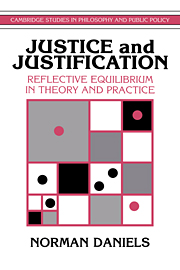Book contents
- Frontmatter
- Contents
- Preface
- 1 Introduction: Reflective equlibrium in theory and practice
- PART I
- 2 Wide reflective equilibrium and theory acceptance in ethics
- 3 Reflective equilibrium and Archimedean points
- 4 On some methods of ethics and linguistics
- 5 Two approaches to theory acceptance in ethics
- 6 An argument about the relativity of justice
- 7 Moral theory and the plasticity of persons
- 8 Reflective equilibrium and justice as political
- PART II
- Index
7 - Moral theory and the plasticity of persons
Published online by Cambridge University Press: 01 February 2010
- Frontmatter
- Contents
- Preface
- 1 Introduction: Reflective equlibrium in theory and practice
- PART I
- 2 Wide reflective equilibrium and theory acceptance in ethics
- 3 Reflective equilibrium and Archimedean points
- 4 On some methods of ethics and linguistics
- 5 Two approaches to theory acceptance in ethics
- 6 An argument about the relativity of justice
- 7 Moral theory and the plasticity of persons
- 8 Reflective equilibrium and justice as political
- PART II
- Index
Summary
There is a hoary tradition in moral philosophy that assumes we cannot determine which moral theory is acceptable or correct unless we have available a correct theory of human nature, or, in its more modern form, of the person. With such a theory of the person, however, we could at least narrow down the choice among competing ethical theories. A more recent tradition, at least in one of its standard interpretations, agrees it would be necessary to have a correct theory of the person before we could determine an acceptable moral theory, but it denies there is a determinate nature of the person to be captured in such a theory. The plasticity of the person, according to this strand of Marxist theory, rules out the possibility of there being universal moral theory at all. In this paper, I would like to explore a view that treads an intermediate path. It agrees with the Marxist denial that there is a determinate nature of the person, a deep fact of the matter, that can be abstracted from the social matrix and made the subject of a (nonmoral) theory of the person. And, it agrees with both traditions that moral theory depends on and embodies a theory of the person. But, by making the problem of arriving at an acceptable view of the person itself something that depends on overall theoretical considerations, including moral ones, the intermediary view may be able to avoid the type of moral relativism associated with the Marxist view.
- Type
- Chapter
- Information
- Justice and JustificationReflective Equilibrium in Theory and Practice, pp. 120 - 143Publisher: Cambridge University PressPrint publication year: 1996
- 1
- Cited by



